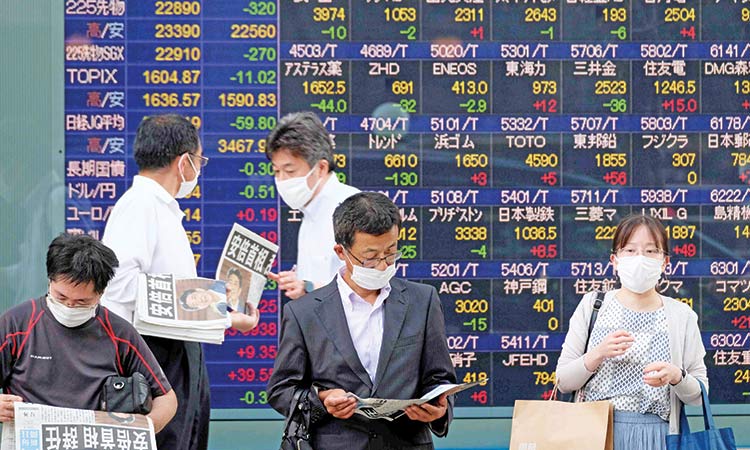Yen surges as Abe quits, stocks rally anew on consumer spending

Patrons read about Prime Minister Shinzo Abe’s resignation in front of the Tokyo Stock Exchange in Tokyo on Friday. Agence France-Presse
The dollar slid and gold rose almost 2%, reversing their directions from Thursday, when the US Federal Reserve laid out its new stance on inflation, which reinforced expectations of a prolonged low-interest-rate environment.
Longer-term yields climbed sharply on Thursday after Fed Chair Jerome Powell unveiled a new approach to monetary policy that puts more emphasis on fighting shortfalls in unemployment and less weight on concerns about higher inflation.
US consumer spending increased more than expected last month, raising expectations for a sharp rebound in growth in the third quarter, though momentum could ebb as the COVID-19 pandemic lingers and fiscal stimulus dries up.
The Commerce Department report also showed a rise in personal income after two straight monthly declines, while monthly inflation pushed higher.
Momentum is driving US equities higher, said Tim Ghriskey, chief investment strategist at Inverness Counsel in New York.
“A lot of this is momentum. It’s just fear of being left behind, fear of missing out,” Ghriskey said. “Value has been outperforming growth, and you’re seeing that reverse today. When growth underperforms for a period of days, it tends to rebound very sharply. We’re seeing that in market preferences today.”
MSCI’s benchmark for global equity markets rose 0.4% to 585.55, after earlier setting a new intraday high, while stocks on Wall Street also rallied, with technology leading the way.
The Dow Jones Industrial Average rose 0.3%, the S&P 500 gained 0.30% and the tech-laden Nasdaq Composite added 0.62%.
In Europe, stocks slipped as investors dumped this year’s outperformers, including technology and healthcare stocks, and bid up banking shares after the Fed unveiled its new policy framework.
The broad pan-regional FTSEurofirst 300 index dropped 0.39% to 1,431.48.
In Japan, the benchmark Nikkei 225 share index closed down 1.4% while the yen, seen as a safe-haven currency to buy in times of uncertainty, strengthened 1.20% versus the greenback at 105.29 per dollar.
The yen was on course for its biggest one-day jump since March, when the coronavirus pandemic roiled global markets.
There has been speculation about Abe’s health all week but the resignation of Japan’s longest-serving premier rattled investors, given he has spearheaded efforts to revive growth through his reflationary “Abenomics” policies.
Some analysts said the yen’s rally seemed excessive given Abe’s successor was unlikely to alter economic policy significantly because Japan remains in the middle of a battle to avoid deflation and lift growth.
The yield on the 10-year US Treasury note fell 2.5 basis points to 0.7178% as investors rebalanced intermediate-dated debt following large auctions earlier this week.
US Treasury auctions of roughly $150 billion worth of 3-year, 5-year and 7-year notes received strong demand starting on Tuesday. The decline in yields on each of those instruments on Friday likely reflected traders repositioning, said Subadra Rajappa, head of US rates strategy for Societe Generale.
German bond yields briefly rose to their highest since early June after the Fed’s decision to target average inflation.
Oil prices inched lower as storm Laura passed the heart of the US oil industry in Louisiana and Texas without causing widespread damage and companies began to restart operations.
Spot gold prices rose 1.98% to $1,967.11 an ounce.
Oil prices inched lower on Friday as Hurricane Laura passed the heart of the US oil industry in Louisiana and Texas without causing any widespread damage and companies were beginning to restart operations.
Brent crude futures for October, set to expire on Friday, were down 11 cents to $44.98 a barrel by 11:01 a.m. ET (1501 GMT.) US West Texas Intermediate (WTI) crude fell 18 cents to $42.86 a barrel.
Both benchmarks were on track for weekly gains of about 1.3%, with WTI headed for a fourth straight weekly rise. The benchmarks hit five-month highs earlier in the week as US producers cut crude output ahead of Laura at a rate close to the level of 2005’s Hurricane Katrina.
“The oil trade has been featured by strong advances at the start of the week as a sizable amount of storm premium was pumped into the market ahead of Hurricane Laura, followed by a major erasure of hurricane premium following the storm’s arrival as limited impact on offshore crude production or refinery activity was indicated,” said Jim Ritterbusch, president of Ritterbusch and Associates. Indeed the market has been stuck in an unusually long spell of low volatility, analyst Eugen Weinberg at Commerzbank said, in contrast with stock markets.
“It didn’t even react to a weaker dollar. There’s no impulse in either direction. It has seldom had so little volatility for such a long period, especially given the dynamic situation on the demand and supply sides,” Weinberg said.
Agencies







